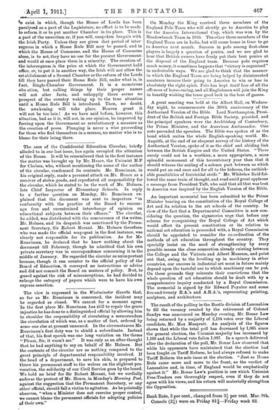The case of the Confidential Education Circular, briefly alluded to
in our last issue, has again occupied the attention of the House. It will be remembered that in the first instance the matter was brought up by Mr. Hoare, the Unionist M.P for Chelsea, who, without mentioning the name of the author of the circular, condemned its contents. Mr. Runciman, in his original reply, made a personal attack on Mr. Hoare as a receiver of stolen goods, and repudiated all responsibility for the circular, which he stated to be the work of Mr. Holmes, late Chief Inspector of Elementary Schools. In reply to a further question on Monday, Mr. Runciman ex- plained that the document was sent to inspectors "in conformity with the practice of the Board to encour- age free and unrestrained interchange of opinion on educational subjects between their officers." The circular, be added, was distributed with the concurrence of the writer, Mr. Holmes, and its despatch was sanctioned by the Perma- nent Secretary, Sir Robert Morant. Mr. Holmes therefore, who was made the official scapegoat in the first instance, was clearly not responsible for its publication. As for Mr. Runciman, he declared that he knew nothing about the document till February, though he admitted that his own private secretary was in correspondence concerning it in the middle of January. He regarded the circular as unimportant because, though it ran counter to the official policy of the Board of Education, it conveyed no instructions or advice and did not commit the Board on matters of policy. But, to guard against the risk of misconceptions, he had decided to enlarge the category of papers which were to have his own express sanction.










































 Previous page
Previous page